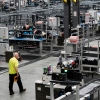A federal court blocked President Trump’s sweeping tariffs on imports this week, but the administration has promised to appeal. The on-again-off-again import taxes have been a source of frustration for many businesses that don’t know what their costs will be from day to day.
Jim Watson/AFP via Getty Images
hide caption
toggle caption
Jim Watson/AFP via Getty Images
Many American small-business owners have been riding a rollercoaster of tariff-related feelings: worry, confusion, anxiety, frustration.
This week, there are new emotions.
“I feel a lot of relief and hope,” says Sarah Wells, whose Virginia company sells breast-pump backpacks and other maternity accessories. In March, she had to find an extra $15,000 to receive her shipment from China – the last for now – which was traveling to the U.S. when the White House first raised tariffs.
Now that two federal courts have ruled that President Trump had overstepped his authority in ordering the tariffs, Wells ponders the same question most of her peers are asking: Will they get that money back?
But also, as the White House vows to appeal, there’s the perennial other thought: Is this simply the latest curve on the tariff rollercoaster?
Stockpiling pet life jackets in the bathroom
Barton O’Brien prepared for tariffs by stockpiling every space he had with leashes, harnesses and other pet supplies that he sells at hundreds of stores.
“We had dog life jackets in the bathroom,” says O’Brien, a former Marine who now runs BAYDOG from Kent Island in Maryland. “Our warehouse was bursting. We had to rent a container and put it out back.”

Barton O’Brien, shown with his dog Walter, runs the BAYDOG company, which sells harnesses, life-jackets and other pet supplies. He imports products from China, India and Vietnam, and double-digit tariffs have been challenging for his business.
courtesy of Barton O’Brien
hide caption
toggle caption
courtesy of Barton O’Brien
Now, he’s been watching several businesses sue the Trump administration over tariffs after canceling some of his own orders for doggie sweaters.
He’d prepared for double-digit tariffs on China, but not on his shipments from suppliers in India and Vietnam. A threatened 26% tax on imports from India would have more than eclipsed his profit margin, so O’Brien canceled orders for much of what he planned to sell this fall. And for items he will sell next year? He’s gambling the tariffs will be lower in the months to come – maybe thanks to the Supreme Court taking up the tariff case.
“The production cycle is very long. So you need to plan things six months, eight months out,” O’Brien says. “We don’t know what the tariff regime is going to be, but we have to at least get them made and then hopefully we get a favorable decision.”
Court decisions paused for now
Late Wednesday, the U.S. Court of International Trade struck down many of Trump’s tariffs, ruling in favor of 12 states and five businesses. The following day, a U.S. appeals court temporarily put that judgment on hold until the legal proceedings play out.
Also on Thursday, a second federal court blocked Trump’s authority to unilaterally impose tariffs, ruling in favor of two Illinois toy importers.
The White House has promised an appeal, defending its use of the 1977 law called the International Economic Emergency Powers Act, or IEEPA.
“We expect to fight this battle all the way to the Supreme Court,” said spokeswoman Karoline Leavitt.
In the meantime, businesses are left in the murky waters — hesitant to make more or ship more, unsure where to build factories or how high to raise prices.
“I’m not planning to do anything right now,” says Rozalynn Goodwin from South Carolina, who sells patented double-snap hair barrettes called GaBBY Bows, made in China. “I don’t trust what’s going on right now, I just don’t.”
Paying tariffs on $3.99 barrettes
Goodwin is at a crossroads: Her firm had won a dream deal to supply GaBBY Bows to hundreds of Claire’s stores. But at one point, tariffs on her products stacked up to more than 170%. When the White House agreed in mid-May to temporarily lower tariffs on Chinese goods, Goodwin’s tariff bill fell to roughly 35% — still unaffordable for her business.
“When you’re selling a product that is $3.99, every cent counts,” Goodwin says. “Every cent.”
She’s had to renegotiate the deal with Claire’s. Instead of new designs and colors, they’ll start with the barrettes Goodwin already has in the country. She’s continued looking for U.S.-based manufacturers, but their prices remain too high. What will she do when her inventory runs out?
“I am hopeful that by the fall, you know, cooler heads are at work, and we can get to some type of resolution,” Goodwin says. “I’m going to make what we have work. Until I cannot make it work anymore.”
Even if new court rulings ultimately stand and abolish Trump’s tariffs under the emergency law, the White House has other legal authorities to set import taxes. But they would likely be more limited in their scale than the worldwide tariffs targeted by this week’s rulings. For example, Section 232 of the Trade Expansion Act allows the president to impose tariffs to address national security threats, and Section 301 of the 1974 Trade Act allows import taxes to punish trade violations. Trump has used both powers in the past to impose tariffs on steel and aluminum imports and goods from China.
Many sellers raise prices
Sarah Wells, whose Sarah Wells Bags sells totes and breast milk coolers, has raised prices by 10% to 15% to offset some of her tariff expenses.
She is one of many business owners that have done so. This week, cosmetics company e.l.f. said it’s raising all of its prices by $1 because of tariffs. Trump lashed out at Walmart earlier this month after the superstore warned of tariff-induced price increases.
“I have just been squeezed from all ends,” Wells says. “The cost of shipping has gone up. The cost of boxes has gone up, shipping labels.”
Last month, when tariffs on goods from China spiked to 145%, importers rushed to stash cargo in bonded U.S. warehouses, where they could temporarily avoid the levies. Then, when the 90-day truce dropped those tariffs to 30%, those same businesses raced to get their cargo out of warehouses and paid extra to ship additional goods.
Wells had found a new manufacturer in Cambodia as a backup for China. But the Cambodian shipments will take time and likely won’t come until early 2026. So she’s watching the tariff lawsuits like a hawk, to decide whether to resume ordering from her China suppliers.
“Until we get a little more clarity, the ultimate irony is we’re not going to see companies rushing to do much of anything, in terms of reshoring to the U.S. or moving out of China,” says Marc Busch, a trade law expert at Georgetown University. “No one knows what could be next. It could change in a heartbeat and that really is the big problem today.”
That same uncertainty has rattled financial markets. Stocks have tumbled each time the president orders new tariffs, only to rebound when Trump backs off. The markets’ reaction to this week’s court rulings has been muted — as investors try to assess the legal and political road ahead.
















Leave a Reply